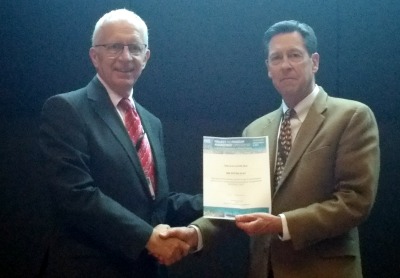
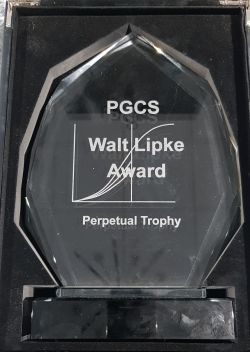 Awarded between 2017 and 2021, the Project Governance and Control Walt Lipke Award was designed to encourage practitioners, academics, and students to creatively think about the challenges our profession faces, suggest innovative solutions and offer a platform for disseminating your ideas to a wide audience.
Awarded between 2017 and 2021, the Project Governance and Control Walt Lipke Award was designed to encourage practitioners, academics, and students to creatively think about the challenges our profession faces, suggest innovative solutions and offer a platform for disseminating your ideas to a wide audience.
Winners received The Walt Lipke Project Governance and Control Excellence Award (Perpetual Trophy), a cash prize, and free attendance at that years PGCS symposium to present their paper.
Walt Lipke is the creator of Earned Schedule, which extracts reliable schedule information from earned value data (resolving the long-standing error in the calculation of SPI and SV). He retired in 2005 as deputy chief of the Software Division at Tinker Air Force Base in the United States where he specialised in the development, maintenance, and management of software for the automated testing of avionics. Mr. Lipke has published articles, and presented at conferences around the world, on the application of earned value management, earned schedule, and statistical methods in the management of projects and programs. His contribution to project controls has been recognised by, among other, PMI, The College of Performance Management, and the EVM Europe Conference.
Award selection criteria.
Selection of the finalists and winner of the Walt Lipke Award each year was at the sole discretion of the PGCAR academic panel and based on the papers:
- ♦ Originality: a new or innovative concept
- ♦ Practicality: the usefulness of the concept in the management of projects, programs and/or portfolios in the
Australian context - ♦ Quality: the academic merit of the paper.
Annual Winners:
- 2017, awarded by Mr. Walt Lipke.
- 2018, awarded by Mr. Walt Lipke.
- 2019, awarded by Hon. Andrew Gee MP, Assistant Minister to the Deputy Prime Minister.
- 2021, awarded by Hon. Andrew Gee MP, Assistant Minister to the Deputy Prime Minister.
The Project Governance & Controls Annual Review (PGCAR)
ISSN 2652-1016 (Online)
An annual review of interesting and practical, industry and academic papers is focused on enhancing the governance and practice of project, program and portfolio management in the Australasian region. Each annual review was published in the month following the Project Governance & Controls Symposium held in August, in Canberra; and included papers received in the preceding year.
Academic papers published in the PGCAR are peer reviewed and relevant to our mission to improve project governance and control. We also publish non-academic papers of a high quality; these may be submitted as part of the Symposium proceedings, or separately.
Publication Index
Sorted by year of publication.
2021 edition: The Project Governance and Controls Annual Update
2020 edition: The Project Governance and Controls Annual Update
2019 edition: The Project Governance and Controls Annual Update
2017-18 edition: The Project Governance & Controls Annual Update
Click through to the full list of academic papers.
2021 Winner
Winner: Ms Roksana Jahan Tumpa (PhD Candidate) - The Walt Lipke Project Governance and Control Excellence Award, plus $1000 prize
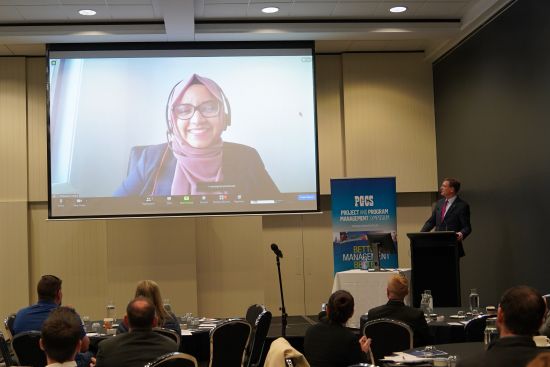
Minister Gee overcoming COVID travel restrictions to present the award.
Developing employability attributes of higher education project management graduates: a scoping review
Projects play a pivotal role in modern enterprises. Functional structures of organisations are being replaced by project-based organisations. Along with the growth in project management, the need for skilled project professionals is mounting for the successful execution of the projects. This reflects the importance of preparing project management graduates for complex project environments. Higher education institutions (HEIs) are responsible for preparing work-ready project management graduates so are responding by continually reviewing and developing effective project management courses. This scoping review focuses on how HEIs are addressing the employers' demand by preparing project management graduates for the industry.
Recent research on work-readiness of project management graduates adds valuable contribution to the literature, however, there is a lack of a rounded overview which focuses on how higher education institutions contribute to the development of employability attributes of project management graduates . Accordingly, this scoping review paper aims to explore the status quo of research on the employability of graduates within the context of project management education. More specifically, the study will capture and investigate the different approaches adopted by of higher education institutions in developing job-ready project management graduates. The paper contributes to the literature by providing insights into project management graduates' job-readiness in order to inform higher education institutions, policymakers and future research.
- Click to download: Developing employability attributes of higher education project management graduates: a scoping review
Biography:
Roksana Jahan Tumpa is a PhD candidate at Central Queensland University Australia. She is also the Research Committee and Student Representative Council member in the Research Higher Degree Division. Her research aims at improving group-based assessments in project management education. She is the recipient of the Research Training Program (RTP) Stipend scholarship. She has recently won the Winner and the People's Choice Award for the Three Minute Thesis (3MT) competition at CQU level. She is the recipient of Best Presentation Award in the School of Engineering and Technology (SET) RHD symposium held in 2019 and 2020.
Roksana has an excellent academic background, with holding Masters in Management for Engineers (Distinction). She also received Vice-Chancellor's scholarship during her postgraduate studies.
2020 Winner
Winner: Munir Ahmad Saeed & Dr Tahmina Rashid - The Walt Lipke Project Governance and Control Excellence Award, plus $1000 prize

Benefits Management – Between Dreams and Realities
In the Project Management (PM) literature Benefits Management (BM) has been highlighted as the real purpose for the implementation of projects both in the public and private sectors. PM literature has been discussing project success since the 80s but since 2000, the focus of project success debates has turned to benefits realization. Benefits realization takes the project success debate from outputs to outcomes, inviting the senior management to shift their focus from project delivery on time and cost, to outcomes and benefits to bring real value to the organization. But the current literature on benefits management, is mainly normative and aspirational, therefore most of the debates in PM literature, are about what should be done, rather than what is happening in practice on benefits management. To fill this gap, recently, a doctorate study research was conducted 45 interviews in six public sector organizations of the Commonwealth government. The emerging research findings highlight a gap between dreams and realities, aspirations and practices in benefits management in the Australian public sector. This research found several factors behind poor benefits realization such as a lack of accountability for benefits, mandatory requirements to report on benefits realization, focus on delivery on time and budget and poor governance and leadership by the senior executives. This article briefly compares what the aspirations of BM literature and the current BM practices in the public sector organizations.
- Click to download: Benefits Management – Between Dreams and Realities
Biography:
Munir Ahmad Saeed, is currently enrolled in Professional Doctorate of Project Management at UNSW Canberra. His research is focused on investigating benefits realization practices in the public sector organizations. He is working as a lecturer at the College of Business, Canberra Institute of Technology (CIT). Saeed has a number of publications to his credit. Previously, he has worked as a journalist in Pakistan for 10 years and has abiding interest in politics and current affairs.
2019 Winner
Winner: Professor Shankar Sankaran - The Walt Lipke Project Governance and Control Excellence Award, plus $1000 prize
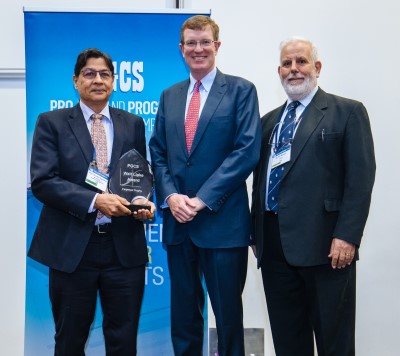
A Model for Organizational Project Management and its Validation
It is important that an organization selects the right projects and carefully manages and governs them to deliver their intended benefits. This paper will describe a model for Organizational Project Management (OPM) to help organizations to do that. OPM is the integration of all project management-related activities of an organization linking strategic decisions (where the project management-related activities are to be carried out) with business decisions (portfolio management and benefits realization) with their management (program and project management) and their governance at both the strategic and project levels. This paper will describe a seven-layered model of OPM with its 22 elements – spanning from the organizational level to the individual project level – derived by the authors using academic literature and their own experience in managing projects. The model adds new elements to OPM such as governance, projectification, benefits realization and organizational design to the conventional 3P (portfolio, program and project management) elements resulting in a more comprehensive model. The developed model was validated with a random sample of organizations in the Netherlands and China. The findings from the validation led to patterns of implementation of OPM in a variety of organizations. The process used for validation as well as the results obtained will be discussed in the paper. The feedback received on this process from academics and practitioners at the PGCS symposium will assist in the development of a web-based diagnostic tool for OPM being put together by the authors.
- Click to download Shankar's paper: A Model for Organizational Project Management and its Validation
- Click to download Shankar's presentation.
Biography:
Shankar Sankaran PhD, MEng is a Professor of Organisational Project Management (OPM)) at the School of the Built Environment at the University of Technology Sydney(UTS). His current research interest is in Organisational Project Management. He has developed and teaching a subject titled Governance, Portfolio and Program Management in a Master of Project Management Course at UTS. He has authored two books on OPM, an edited Cambridge University Press Handbook in 2017 and a new book on OPM being published by Edward Elgar in 2019 Professor Ralf Muller and Professor Nathalie Drouin are also authors of these two books. The three of them were awarded the IPMA Prize for Research in 2019 for their work on Balanced Leadership in Projects about which they completed a PMI Sponsored Research Grant in 2018. Shankar is the Current President of the International Society for the Systems Sciences and Deputy Chair of the Global Accreditation Centre of the Project Management Institute. Shankar has worked as a major project manager and project director in industry before joining academia.
2018 Winner
Winner: Dr. Raymond Young - The Walt Lipke Project Governance and Control Excellence Award, plus $1000 prize
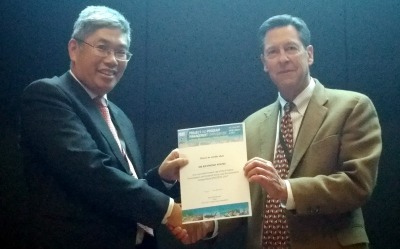
Strategic management of the Defence S&T Portfolio: Are we there yet?
This paper studies an exemplary case of strategy implementation in the Defence Science and Technology Group (DST), a group within the Australian Government Department of Defence. Through three action research cycles between 2016 and 2018, the study has found that DST progressed from an organisation where it was considered difficult to demonstrate strategic alignment of its work to Defence needs to an organisation that manages its portfolio strategically. The lessons for other organisations is to manage improvements in the investment allocation process not so much through the introduction of new tools but as a change management project driven through top management support. A technical lesson is that decision-making about budgets needs to be at the level at which strategy is implemented, that is at a program rather than at a project level. Further research is recommended within Defence and other organisations to evaluate whether strategic benefits can be realised if resources are allocated strategically.
- Click to download Raymond's paper: Strategic management of the Defence S&T Portfolio: Are we there yet?
Biography:
Raymond Young is an international authority in the area of project governance. My research has been published by Standards Australia as HB280 a handbook explaining how boards and top managers influence business projects to succeed. My career objective is to help clients realise strategic business benefits from their projects rather than to simply come in on-time and on-budget. His career alternates between consulting, industry and academia. He is currently a Senior Lecturer at the University of NSW - Canberra. He has a decade of management consulting experience culminating in a CIO role within Fujitsu Australia. Significant clients have included Colgate-Palmolive, BHP, Commonwealth Bank of Australia, Telstra, Department of Health, Electricity Trust of South Australia and Prospect Electricity. Most recently he has been advising Federal Government agencies on how to improve their project, programme and portfolio management practices. I worked closely with both DEEWR and the Department of Social Services to improve their PMOs and I am preparing case studies of how ComSuper and the Australian Tax Office achieved the highest levels of portfolio management maturity in the public sector.
2017 Winners
Winner: Mr. Peter Slay - The Walt Lipke Project Governance and Control Excellence Award, plus $1000 prize
Failure of Public Sector Programs - A Framework to Manage Success Criteria.
Public sector programs are commonly criticised for having poor outcomes. One reason may be that such programs have multiple key stakeholders each with differing opinions regarding what would represent a successful outcome. This paper presents a framework to assist project managers to develop a broad-based success criteria review in consultation with key stakeholders and to manage perceptions of program success throughout the implementation period.
- Click to download Peter's Essay: Failure of Public Sector Programs - A Framework to Manage Success Criteria
- Click to download Peter's Presentation.
Biography:
Peter Slay is studying a PhD in Project Management at the School of Engineering and Information Technology, UNSW Canberra. He holds an M.Sc (Research) 2003 (with 2 associated publications), Grad Dip (Business Admin) 1996 and B.Sc (Civil Engineering) 1975. He has approximately 38 years of professional experience working for Consultants and Government Agencies in a broad range of Civil Engineering disciplines in four continents with the last 20 years specializing increasing in project management roles.

